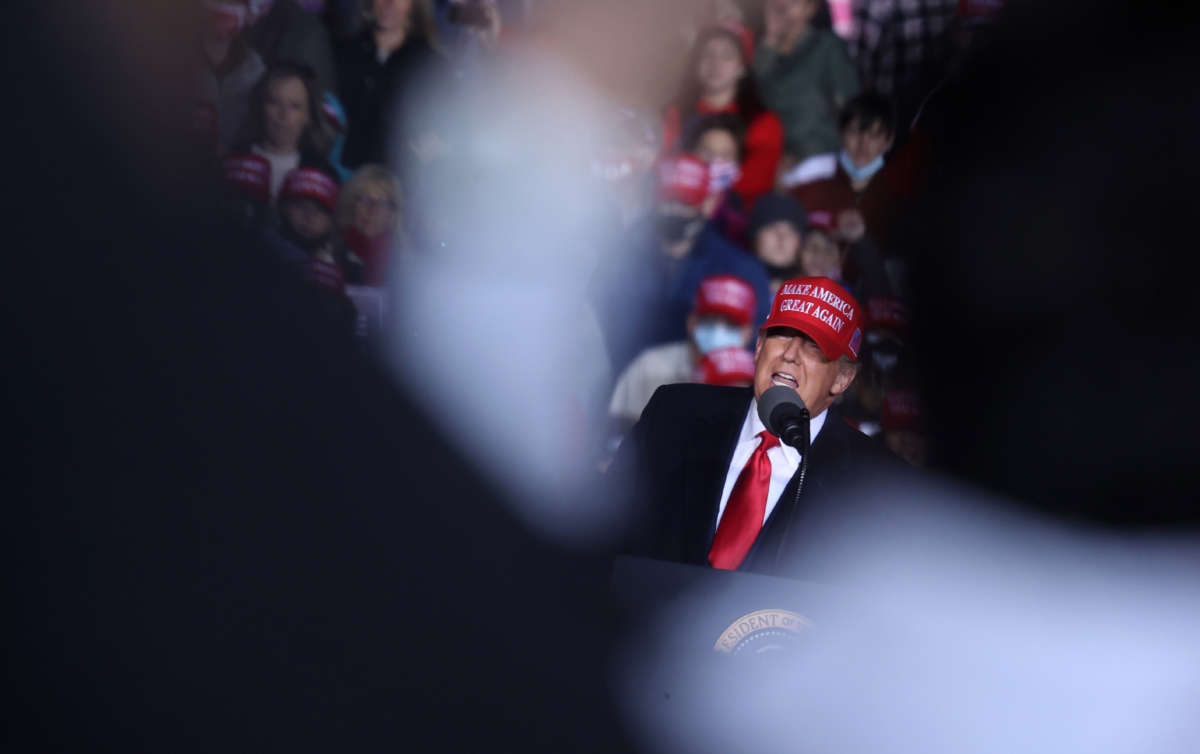Truthout is an indispensable resource for activists, movement leaders and workers everywhere. Please make this work possible with a quick donation.
Georgia election investigators have just announced that only four ballots were cast on behalf of deceased individuals in the state during the 2020 election — further debunking a lie by former President Donald Trump, who attempted to delay the certification of his election loss by claiming that thousands of dead individuals’ votes were included in the final tally.
“Dead people voted,” Trump said in a call to Georgia election officials shortly after Election Day. “And I think the number is in the — close to 5,000 people. And they went to obituaries. They went to all sorts of methods to come up with an accurate number. And a minimum is close to about 5,000 voters.”
This claim was proven to be false after it was fact-checked back in January — and findings by the State Elections Board over the weekend have further confirmed that Trump’s assertions that “dead people” voted are completely unfounded.
In the same call that Trump lied about votes being cast on behalf of deceased people, he demanded that Georgia Secretary of State Brad Raffensperger (R) “find” votes to help him overcome Biden’s margin of victory in the state. Raffensperger is the head of the State Elections Board, which conducted the recent investigation.
The four instances of individuals casting ballots on behalf of deceased people in Georgia’s 2020 presidential election will now be forwarded from the State Elections Board to the state Attorney General’s office, which will determine whether to pursue criminal charges. State law stipulates that individuals can be fined between $100 and $5,000 for casting illegal ballots.
In one of the examples of fraud, a woman voted on behalf of her deceased husband, who had died prior to Election Day, in order to invalidate her own ballot.
“He was going to vote Republican, and she said, ‘Well, I’m going to cancel your ballot because I’m voting Democrat.’ It was kind of a joke between them,” said attorney Barry Bishop, who is representing the woman who cast her husband’s ballot for him after he died. “She received the absentee ballot and carried out his wishes.”
In spite of failing numerous fact-checks on the issue, Trump has continued to insist that dead people’s ballots were counted in the election. Months after leaving office, he has also inflated the numbers; although he originally claimed that 5,000 votes were cast for dead people in Georgia, in a statement last summer, he said that the number was closer to 18,000 votes.
That claim, like Trump’s other assertions of voter fraud, was not substantiated by any evidence.
Georgia election officials remain steadfast in their refusal to give any credence to Trump’s claims of voter fraud. While speaking to constituents during a recent telephone town hall meeting, Raffensperger reaffirmed what he has said from the start: that there wasn’t widespread fraud affecting the outcome of the 2020 presidential election in Georgia.
“What I tell people is what really happened in Georgia, because we proved that none of that was what happened,” he said.
A terrifying moment. We appeal for your support.
In the last weeks, we have witnessed an authoritarian assault on communities in Minnesota and across the nation.
The need for truthful, grassroots reporting is urgent at this cataclysmic historical moment. Yet, Trump-aligned billionaires and other allies have taken over many legacy media outlets — the culmination of a decades-long campaign to place control of the narrative into the hands of the political right.
We refuse to let Trump’s blatant propaganda machine go unchecked. Untethered to corporate ownership or advertisers, Truthout remains fearless in our reporting and our determination to use journalism as a tool for justice.
But we need your help just to fund our basic expenses. Over 80 percent of Truthout’s funding comes from small individual donations from our community of readers, and over a third of our total budget is supported by recurring monthly donors.
Truthout has launched a fundraiser, and we have a goal to add 231 new monthly donors in the next 48 hours. Whether you can make a small monthly donation or a larger one-time gift, Truthout only works with your support.
